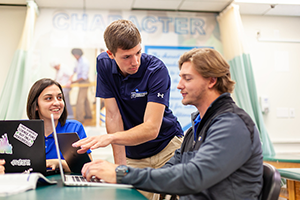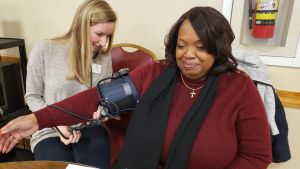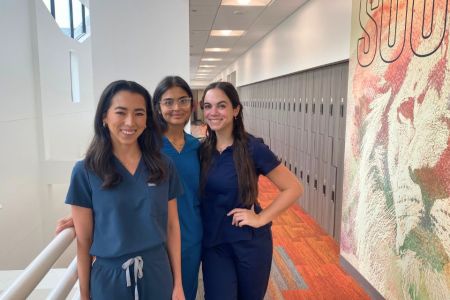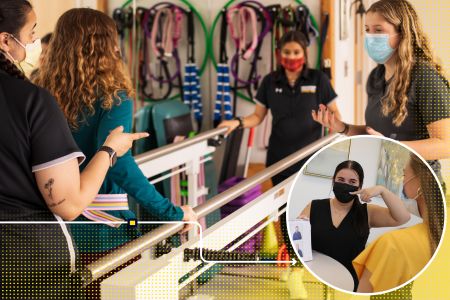Industry Growth
Employment of physician assistants is projected to grow 31 percent by 2030, much faster than the average for all occupations.
By pursuing a master's degree in the physician assistant program at Widener, you'll graduate ready to serve as a leader in your field, with comprehensive medical knowledge and extensive patient care experiences.
Master's
On Campus
108
27 months
Widener's master's degree in the physician assistant program (MS) will strengthen your critical thinking, leadership, and collaboration skills in a uniquely interprofessional, patient- and community-focused program.
As a student in our cohort-based program, you'll develop close connections with faculty mentors committed to diversity, equity, and inclusion as well as fellow students as you move through the sequential curriculum together. You'll dive in strong—working directly with the community in your very first semester through Widener's student-run, pro-bono Chester Community Clinic—and quickly become empowered with in-depth medical knowledge and service-learning experiences that develop one-of-a-kind leaders.
You'll graduate prepared to be an innovative collaborator with the ability and confidence to provide holistic, patient-centered health care with a multi-disciplinary approach.

The ARC-PA has granted Accreditation-Provisional status to the Widener University Institute for Physician Assistant Education Program sponsored by Widener University.
Accreditation-Provisional is an accreditation status granted when the plans and resource allocation, if fully implemented as planned, of a proposed program that has not yet enrolled students appear to demonstrate the program’s ability to meet the ARC-PA Standards or when a program holding Accreditation-Provisional status appears to demonstrate continued progress in complying with the Standards as it prepares for the graduation of the first class (cohort) of students.
Accreditation-Provisional does not ensure any subsequent accreditation status. It is limited to no more than five years from matriculation of the first class.
The program’s accreditation history can be viewed on the ARC-PA website at https://www.arc-pa.org/accreditation-history-widener-university/
View the Loading... for the Physician Assistant Studies program.
The MS program at Widener University will graduate excellent health care professionals to meet the growing need for patients to have access to medicine both locally and globally. The MS program will educate highly effective health care professionals equipped to provide patient-centered medical care to diverse populations across the life span. Students will learn to be competent clinicians, culturally sensitive, socially conscious health care providers able to work in collaboration with other members of the health care team.
The physician assistant program at Widener University will be the leader in physician assistant education by providing experiential and collaborative learning, and interprofessional experiences through community and civic engagement, developing leaders in health care, and ultimately improving the lives of the patients they serve.
| Measures | Cohort 2026 | Cohort 2027 | Cohort 2028 |
| Undergraduate cum GPA | |||
| Undergraduate science GPA | |||
| Direct Patient Care |
| Measures | Cohort 2026 | Cohort 2027 | Cohort 2028 |
| Summative I Written Exam | |||
| Summative I OSCE |
| Measures | Cohort 2026 | Cohort 2027 | Cohort 2028 |
| Student First-time Taker PANCE Pass Rate |
| Measures | Cohort 2026 | Cohort 2027 | Cohort 2028 |
| Preceptor Evaluation of Students (EBM) | |||
| Student Graduate Exit Survey (EBM Preparation) |
| Measures | Cohort 2026 | Cohort 2027 | Cohort 2028 |
| Preceptor Evaluation of Students (Patient-centered care) | |||
| Student Graduate Exit Survey (Patient-centered care Preparation) |
| Measures | Cohort 2026 | Cohort 2027 | Cohort 2028 |
| Preceptor Evaluation of Students (IP Collaboration) | |||
| Student Graduate Exit Survey (IP Collaboration Preparation) |
The Widener University Institute for Physician Assistant competencies represent the requisite medical knowledge, interpersonal skills, clinical and technical skills, professional behaviors, and clinical reasoning and problem-solving skills required for each student to satisfactory demonstrate in order to graduate from the Widener Physician Assistant Program.
a) Perform procedural skills based on a clinical scenario.
This section will capture the outcomes data of our graduates as students move through the master's of physician assistant studies (MPAS) program.
Physician Assistant National Certification Examination
Exam Performance Summary Report
Program Name:
Program Number:
Test Taker Status: All Test Takers
PANCE Pass Rates To be Published Once Available
| Graduated Classes | |||
| 1st Cohort | 2nd Cohort | 3rd Cohort | |
| Maximum Entering Class Size (as approved by ARC-PA) | |||
| Entering Class Size | |||
| Graduates | |||
| *Attrition Rate | |||
| **Graduation Rate | |||
1. Admit students who are underrepresented in the PA field.
| Measures | 1st Cohort | 2nd Cohort | 3rd Cohort |
| Undergraduate cum GPA | |||
| Undergraduate science GPA | |||
| Direct patient care | |||
| Racial/ethnic diversity | |||
| Male Gender |
2. Foster a student commitment to service-learning.
| Measures | 1st Cohort | 2nd Cohort | 3rd Cohort |
| Avg. student hours of community service |
3. Successfully prepare student for entry level practice.
| Measures | 1st Cohort | 2nd Cohort | 3rd Cohort |
| Student Summative Exam | |||
| Student first-time taker PANCE pass rate |
4. Emphasize a commitment to evidence-based medicine and life-long learning.
| Measures | 1st Cohort | 2nd Cohort | 3rd Cohort |
| Preceptor evaluation of students (EBM) | |||
| Faculty evaluation of curriculum (Student EBM preparation) | |||
| Student graduate exit survey (EBM preparation) |
5. Prepare students to be patient-centered and practice interprofessional collaboration.
| Measures | 1st Cohort | 2nd Cohort | 3rd Cohort |
| Preceptor evaluation of students (patient-centered care) | |||
| Faculty evaluation of curriculum (student patient-centered care preparation) | |||
| Student graduate exit survey (patient-centered care preparation) | |||
| Preceptor evaluation of students (IP collaboration) | |||
| Faculty evaluation of curriculum (student IP collaboration preparation) | |||
| Student graduate exit survey (IP collaboration preparation) |
The Widener University physician assistant program is dedicated to diversity, equity, and inclusion. We, as a university, program, faculty, and staff, desire to embrace students of all different cultures, backgrounds, and identities. We are committed to the development and delivery of a curriculum that is anti-racist, anti-oppressive, and reflects and respects our professional values. We seek to create an intentionally diverse educational community in which students, staff, and faculty perspectives are valued and meaningfully incorporated into our daily experience.
Upon the program's receipt of accreditation from ARC-PA, all graduating PA students will be eligible to sit for the NCCPA (National Commission on Certification of Physician Assistants) PANCE (Physician Assistant National Certification Examination) upon graduation. A passing score on this examination allows graduates to obtain licensure to practice medicine as a physician assistant in all states and territories. For more information, review PANCE eligibility.
Employment of physician assistants is projected to grow 31 percent by 2030, much faster than the average for all occupations.
Average annual salary of a physician assistant

Through close collaboration with faculty and students from other professional health care programs, you'll graduate with an in depth understanding of multi-disciplinary health fields to better support your patients and clients. Throughout the program, you'll have shared academic courses and experiential opportunities supporting holistic approaches to care.

As a student, you’ll participate in experiential learning and community engagement projects in collaboration with community partnerships through the Chester Community Clinic. The Chester Community Clinic is an interprofessional student-run pro bono clinic that provides both onsite services and extension of community engagement service opportunities within the community.
Here, you will work collaboratively with students and faculty from our physical therapy, occupational therapy, speech-language pathology, nursing, clinical psychology, and social work programs alongside community leaders to address the various healthcare needs in the community. We call upon all of our health science students to help make a positive difference in the community in which they are living and learning in their time at Widener while simultaneously advancing their own educational goals.
With support from faculty mentors and clinical practitioners, you'll develop into a citizen of character who demonstrates professional and civic leadership. As a student in the PA program, you'll have the opportunity to lead your student colleagues through experiences in the Chester Community Clinic.
The Widener University Physician Assistant Program will bolster your passion for patient care by inspiring you to engage in the community through service learning, explore your role as a health care provider and leader in the physician assistant field, and enhance your skills as a patient and community health care advocate.

The human body is amazing!! Learning the human body through dissection is a fantastic way to appreciate the clinical issues that develop in those who present for various treatments. Widener University has a state-of-the-art lab that enhances & facilitates the learning process.

The clinical anatomy lab provides graduate health science students with hands-on access to study anatomy, master techniques and build confidence ahead of practice. In this first-person narrative, physician assistant students Sarah Connors, Jordan Li and Vrunda Patel share how the experience not only teaches them about the body, it deepens their understanding of the human experience.

In this podcast interview, Dr. Julie E. Wollman reflects on her service as president of Widener University since 2016.

The expansion of health science programs in the College of Health & Human Services and School of Nursing is bolstering Widener’s interprofessional learning approach that has set the programs apart and put students on track to becoming competent and compassionate clinicians.
Our admissions and financial aid teams are here to support you every step of the way. Have a question? Ask away!
The Graduate Record Exam (GRE) is not required for admissions to the Institute for Physician Assistant Education.
All prerequisite requirements must be passed with a C or better to meet program admission standards.
Candidates for the physician assistant program must be able to independently, with or without reasonable accommodations, meet the following technical standards for admission, progression, and graduation from the program. The student must possess the minimal physical, emotional and social abilities to be a successful student. Candidates must have motor function capabilities, physical and emotional endurance that meet the demands of the program. If the student requires assistance in meeting the technical standards, they should make early contact with the Widener University Student Accessibility Office or call (610)499-1266.
Students are required to complete a minimum of 500 hours of direct patient/client care. This can be done through employment or volunteer experiences. It is recommended that the student complete at least 40 hours of shadowing with a PA.
The following is a sample list of acceptable areas for experiential healthcare patient/client contact hours:
| Examples of Acceptable Healthcare Experiences (included but are not limited to): | ||
| Athletic trainer | Medical scribe | Certified nursing assistant |
| Medical corpsman | Dental hygienist/assistant | Dietician |
| Medical caregiver | Emergency department technician | EMT/paramedic |
| Exercise physiologist | Foreign medical graduate - physician | Home health care aide |
| Phlebotomist | Medical assistant | Mental health technician |
| Medical Research with patient contact | Physical therapist | Occupational therapist |
| Speech pathologist | Nurse | Midwife |
All students outside the reserved seat program must apply through Centralized Application Service for Physician Assistants (CASPA) website. Upon completion and verification of the application, you may be asked to come for an interview day.
The deadline for submitting to CASPA is October 1st.
Widener University's physician assistant studies (MS) program maintains the following articulation agreements:
Several other articulation agreements are currently being developed.
The Widener University Physician Assistant Program is dedicated to enrolling students of all backgrounds. In making admissions decisions, the program will conduct a holistic review of each applicant as permissible by law, taking into account, among other factors, an applicant’s geographic residency (including residence in Chester), participation in community service, U.S. uniformed service, and alumni status.
The Institute for Physician Assistant Education defines community engagement/service as any activity or service intended to benefit the local community or society as a whole.
Applicants are encouraged to articulate their level of commitment to community engagement/service and share evidence of their engagement and service within their application materials. Also see admissions rubric. Volunteer service that meets the requirement for the hours of direct patient/client care can serve as evidence of community engagement and/or service.
Because Widener is a private institution, we're able to offer financial assistance that brings our education within reach for individuals who might otherwise not be able to afford it.
You might be surprised how much we are able to offer.
Getting started is easy. Simply apply to Widener and submit your FAFSA to be automatically considered for scholarships and grants. "FAFSA" stands for the Free Application for Federal Student Aid and helps identify whether you are eligible for aid awarded by Widener, the government, and other sources. Our school code is 003313.
In order to receive a financial aid offer, students must meet certain eligibility requirements. Here are the general eligibility requirements for most financial aid programs:
Learn more about applying for financial aid as a graduate student
Simply apply to Widener and complete the financial aid process to be automatically considered for scholarships and grants. Because Widener is a private institution, we are able to offer financial assistance that brings our education within reach for individuals who might otherwise not be able to afford it. You might be surprised at how much we are able to offer in assistance.
In order to receive your part of the financial aid pie, all you have to do is submit your FAFSA. "FAFSA" stands for the Free Application for Federal Student Aid and helps identify whether you are eligible for aid awarded by Widener, the government, and other sources.
Widener offers a limited number of graduate assistantships to enrolled students. GAs receive tuition assistance for their work. Once you're a student, contact your program director for more information.
Widener University also partners with many local organizations and corporations to offer discounted tuition and other incentives to their employees. Don't see your company on the list? Ask them to become a partner. In addition, employers often offer educational reimbursement benefits. We encourage you to explore these opportunities and will be glad to provide any necessary documentation.
A limited number of university-based scholarships are made available to enrolled graduate students made possible directly from our academic department or thanks to the generosity of university donors. No extra steps are needed to be taken prior to admission. Once enrolled, contact your program director to learn more.
If you graduated with a degree from Widener, you may qualify for a 20% tuition discount. The first step to see what you qualify for is to submit your application. Widener offers students many paths to savings, and while we don't offer "double discounts", we'll make sure you'll get the biggest financial benefit you're eligible for. Only students who have completed an associate's, bachelor's, master's, or doctoral degree are eligible. Students who have pursued a 4+1, 4+2, or 3+3 pathway, graduate assistantship, Widener-funded scholarship, or other tuition discount may not be eligible if the financial discount granted surpasses 20%.
For questions, please contact the program director.
View the 2025-2026 graduate tuition rate and payment guide for a complete breakdown of estimated program costs.
To visit Widener is, often, to fall in love with the place. To fit your timeline and schedule, we offer a variety of ways to get to know us.
We offer a variety of virtual events to get to know Widener and meet with faculty and admissions staff.
Have a question about Widener? Drop us a line and an admissions counselor will be in touch. We're always happy to help!
The Widener Institute for Physician Assistant Education is now accepting applications for Fall 2024 and Fall 2025 through CASPA. Applications will be reviewed; however, acceptance and matriculation are dependent on the outcome of the March meeting of the ARC-PA and provisional accreditation is achieved.
Hyatt Hall
14th St
Chester, PA 19013

ACN 125

